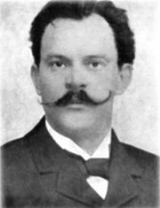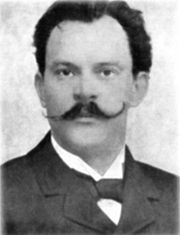
Silvije Strahimir Kranjcevic
Encyclopedia

Croatia
Croatia , officially the Republic of Croatia , is a unitary democratic parliamentary republic in Europe at the crossroads of the Mitteleuropa, the Balkans, and the Mediterranean. Its capital and largest city is Zagreb. The country is divided into 20 counties and the city of Zagreb. Croatia covers ...
n poet
Poet
A poet is a person who writes poetry. A poet's work can be literal, meaning that his work is derived from a specific event, or metaphorical, meaning that his work can take on many meanings and forms. Poets have existed since antiquity, in nearly all languages, and have produced works that vary...
. His reflexive poetry, reaching its zenith in the 1890s, was a turning point that ushered modern themes in Croatian poetry.
Early life
Kranjčević was born in SenjSenj
Senj , German Zengg, Hungarian Zeng and Italian Segna) is the oldest town on the upper Adriatic, and it was founded in the time before the Romans some 3000 years ago on the hill Kuk. It was the center of the Illyrian tribe Iapydes. The current settlement is situated at the foot of the slopes Mala...
. Rebellious as a teenager, he completed his secondary education in a Gymnasium
Gymnasium (school)
A gymnasium is a type of school providing secondary education in some parts of Europe, comparable to English grammar schools or sixth form colleges and U.S. college preparatory high schools. The word γυμνάσιον was used in Ancient Greece, meaning a locality for both physical and intellectual...
, but did not graduate from it. Soon after joining the elite Germanico-Hungaricum Institute in Rome
Rome
Rome is the capital of Italy and the country's largest and most populated city and comune, with over 2.7 million residents in . The city is located in the central-western portion of the Italian Peninsula, on the Tiber River within the Lazio region of Italy.Rome's history spans two and a half...
, where he was supposed to become a priest, he changed his mind and left. The short stay in the Eternal City would show through in his poetry years later.
He attended the one-year course for language and history teachers in Zagreb
Zagreb
Zagreb is the capital and the largest city of the Republic of Croatia. It is in the northwest of the country, along the Sava river, at the southern slopes of the Medvednica mountain. Zagreb lies at an elevation of approximately above sea level. According to the last official census, Zagreb's city...
. With the diploma for a teacher in “citizen schools”, he left to work in Bosnia and Herzegovina
Bosnia and Herzegovina
Bosnia and Herzegovina , sometimes called Bosnia-Herzegovina or simply Bosnia, is a country in Southern Europe, on the Balkan Peninsula. Bordered by Croatia to the north, west and south, Serbia to the east, and Montenegro to the southeast, Bosnia and Herzegovina is almost landlocked, except for the...
. Mostar
Mostar
Mostar is a city and municipality in Bosnia and Herzegovina, the largest and one of the most important cities in the Herzegovina region and the center of the Herzegovina-Neretva Canton of the Federation. Mostar is situated on the Neretva river and is the fifth-largest city in the country...
, Livno
Livno
Livno is a town in western Bosnia and Herzegovina, in Canton 10 of the Federation of Bosnia and Herzegovina, located between Tomislavgrad, Glamoč, Bosansko Grahovo, Kupres and the Croatian border.- Position :...
, Bijeljina
Bijeljina
Bijeljina is a city and municipality in northeastern Bosnia and Herzegovina. The city is the second largest in the Republika Srpska entity after Banja Luka and fifth largest city in Bosnia and Herzegovina, and is situated on the flat rich plains of Semberija...
, Sarajevo
Sarajevo
Sarajevo |Bosnia]], surrounded by the Dinaric Alps and situated along the Miljacka River in the heart of Southeastern Europe and the Balkans....
: those were the cities where he taught and wrote poetry.
He published his first poem, Zavjet (The Pledge) in 1883, a couple of months before leaving for Rome. The magazine where it was published, Hrvatska vila, was led by Eugen Kumičić
Eugen Kumicic
Eugen Kumičić was a prominent Croatian writer and politician.-Biography:Kumičić was born in Brseč, Mošćenička Draga , a small town in Istria, then part of the Austrian Empire....
, a famous writer and politician of the time, who enthusiastically welcomed the fighting spirit in the verses of the unknown young poet. Kranjčević sent another two poems from Rome in 1884, Pozdrav (Salute) and Senju-gradu (Poem for Senj), to Sloboda, a magazine in Sušak
Sušak
Sušak is a part of the city of Rijeka in Croatia, where it composes the eastern part of the city.In 1924, Rijeka belonged to the independent Free State of Fiume, which had been created four years earlier under the Treaty of Rapallo, but in the Treaty of Rome the Kingdom of Serbs, Croats, and...
. When he came back from Rome, he published Noć na Foru (A Night at the Forum) in Vijenac
Vijenac
Vijenac is a biweekly magazine for literature, art and science, established in December 1993 and published by Matica hrvatska, the central national cultural institution in Croatia.-Historical background:...
.
Politically, he was a follower of Starčević and the Croatian Party of Rights. The dark moods of his poems are related to the Hungarian oppression of Croatia.
Bugarkinje
His first poetry book, Bugarkinje (1884), was published in his native Senj. It already announced his three main themes: Homeland, Man and Universe. Kranjčević would never change them, just make them deeper. Bugarkinje is a traditional name given to elegiac folk songs in the Balkans. The first criticism on the book was written by the classical philologist and literary critic Milivoj Šrepel in VijenacVijenac
Vijenac is a biweekly magazine for literature, art and science, established in December 1993 and published by Matica hrvatska, the central national cultural institution in Croatia.-Historical background:...
. He praised the work, but foresaw that the poet would "not be wreathed with laurels but bitter wormwood, so maybe this is why his creations are often shot with sharp sarcasm and cold irony".
Later literary figures heaped even more praise on Bugarkinje. The great writer Miroslav Krleža
Miroslav Krleža
Miroslav Krleža was a leading Croatian and Yugoslav writer and the dominant figure in cultural life of both Yugoslav states, the Kingdom and the Republic . He has often been proclaimed the greatest Croatian writer of the 20th century.-Biography:Miroslav Krleža was born in Zagreb, modern-day...
said they presented Kranjčević as a genuine "standard-bearer of freedom". More recently, the literary historian Ivo Frangeš said that the prophetic and bitter energy of its poems, although occasionally falling into pathos and rhetoric, embraced universal and cosmic themes, which made the young Kranjčević stand out among his contemporaries, such as August Harambašić
August Harambašic
August Harambašić was a Croatian writer, poet, publisher, politician and translator from the 19th century.He was born in Donji Miholjac, and studied law in Vienna and Zagreb. Politically he followed the sharp line of Ante Starčević's Croatian Party of Rights, which landed him in jail several times...
, whose main themes were declamatory patriotism or romantic love.
Bugarkinje tried to formulate a poetic and political program, with the dedicatory poem to August Šenoa
August Šenoa
August Šenoa was a Croatian novelist, critic, editor, poet, and dramatist....
expressing the poetic credo
Credo
A credo |Latin]] for "I Believe") is a statement of belief, commonly used for religious belief, such as the Apostles' Creed. The term especially refers to the use of the Nicene-Constantinopolitan Creed in the Mass, either as text, Gregorian chant, or other musical settings of the...
of Kranjčević, while the poems to Croatia
Croatia
Croatia , officially the Republic of Croatia , is a unitary democratic parliamentary republic in Europe at the crossroads of the Mitteleuropa, the Balkans, and the Mediterranean. Its capital and largest city is Zagreb. The country is divided into 20 counties and the city of Zagreb. Croatia covers ...
, the People and the Worker stood as three pillars of the poet's national and political beliefs.
Kranjčević used Biblical
Bible
The Bible refers to any one of the collections of the primary religious texts of Judaism and Christianity. There is no common version of the Bible, as the individual books , their contents and their order vary among denominations...
and classical
Greek mythology
Greek mythology is the body of myths and legends belonging to the ancient Greeks, concerning their gods and heroes, the nature of the world, and the origins and significance of their own cult and ritual practices. They were a part of religion in ancient Greece...
parables, as well as symbols from the history of Christianity
Christianity
Christianity is a monotheistic religion based on the life and teachings of Jesus as presented in canonical gospels and other New Testament writings...
and Judaism
Judaism
Judaism ) is the "religion, philosophy, and way of life" of the Jewish people...
; their allegorical
Allegory
Allegory is a demonstrative form of representation explaining meaning other than the words that are spoken. Allegory communicates its message by means of symbolic figures, actions or symbolic representation...
nature suited his poems about the fundamental human issues.
Later life
His next poetry book, Selected Poems, came more than a decade later, in 1898. The 1890s marked the zenith of his poetic work. It would be followed by two more books: Trzaji (Quivers) in 1902 and Poems in 1908.In Sarajevo
Sarajevo
Sarajevo |Bosnia]], surrounded by the Dinaric Alps and situated along the Miljacka River in the heart of Southeastern Europe and the Balkans....
, he was the editor of Nada, a literary magazine published by the Bosnian government, for eight years (1895-1903). The nominal editor was the government adviser Kosta Hormann, a man of wide horizons and the benefactor of Antun Gustav Matoš
Antun Gustav Matoš
Antun Gustav Matoš was a Croatian poet, short story writer, journalist, essayist and travelogue writer. He is considered the champion of Croatian modernist literature, opening Croatia to the currents of European modernism, and one of the greatest Croatian literary figures of all time.-Life:Matoš...
, but he trusted Kranjčević with the editorial policy. Because of such freedom, "Nada" attracted the greatest Croatian writers of the time, becoming the most important literary magazine of the Croatian pre-modernist movement, Moderna. It was there that Kranjčević published most of his literary essays and criticisms.

